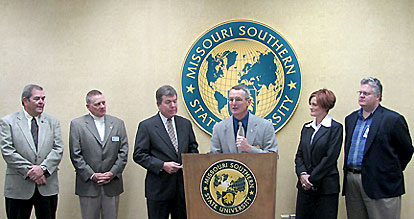
Welcoming the news presented by Congressman Roy A. Blunt (left of podium) of the passage of the Charitable Giving Act of 2005 is Curt Betebenner, executive director-benefits of the Missouri Southern Foundation. Surrounding them from L-R are Bill Putnam of the Community Foundation of Southwest Missouri; John Tiede, Missouri Southern Foundation's director of major gifts/planning; Terri Heckmaster, executive director of the Freeman Foundation and David Dillon, director of the Mercy Regional Health Foundation.
Local fund-raisers heralded passage of the Charitable Giving Act of 2005, legislation introduced by Congressman Roy A Blunt (R-MO) and co-sponsored by Harold Ford (D-TN) that became a part of the Pension Protection Act of 2006 signed into law by President George Bush on August 17, 2006. They met today in a brief ceremony at Missouri Southern State University in Joplin.
Among the charitable tax incentives included in the legislation, and in effect for 2006 and 2007, is an IRA rollover provision benefiting the wealthy that allows them, if they are age 70½ and older, to make donations to public charities up to $100,000 from an IRA without having to count the donation as taxable income. The distribution must be set up so that it goes directly to the public charitable organization named.
Retired Bradleyville businessman and philanthropist James Leon Combs and his wife Dot made one of the first such gifts in the region to the Skaggs Foundation in Branson, Blunt announced.
Skaggs Community Health Center will receive the entire gift without Washington taking a $40,0000 cut," Blunt said. "The new law enhances the value of the gift. It's a great deal for the charity and the people who will benefit from the medical care the medical center provides. It's a good deal for Mr. Combs, too."
The bill also also exempts blood banks from certain excise taxes and provides tax deductions for restaurants and other businesses that make donations of food inventory to food banks and pantries, Blunt pointed out.
In commenting about the short length of time the bill allows for setting up the charitable distribution, John Tiede, director of gifts and planning for the Missouri Southern Foundation, called the two years a "test to see the tax impact." He cited the law as creating "potential for gift-giving heretofore unable to obtain."
Terri Heckmaster, executive director of the Freeman Foundation, described the new rule as an opportunity for donors to create living legacies--"to experience the joy," she said, "during one's lifetime of having made contributions". She hopes that the the age requirement is lowered for those 59 1/2 wanting to contribute.
"[People] should be able to do it at 59 1/2," Blunt said, "but we couldn't get this passed."
Other changes
Younger taxpayers of all ages, on the other hand, will be facing somewhat stricter rules for documenting their charitable deductions when they itemize them on their tax returns, a provision that is expected to cut down substantially on the creation of fraudulent returns. Starting in 2007, taxpayers will need to keep receipts documenting all monetary donations they claim as charitable deductions on their tax return and have appraisals for all donated items valued in excess of $500.
Another provision, effective January 1, 2007, is that a beneficiary other than a spouse will not be subject to immediate income tax on a lump sum distribution from a qualified retirement plan at the owner's death. This is a new opportunity requiring certain conditions that provide for an adult child, or for a partner who is not a spouse.
For a link to a detailed summary of the giving incentives and reforms go here.






Comments